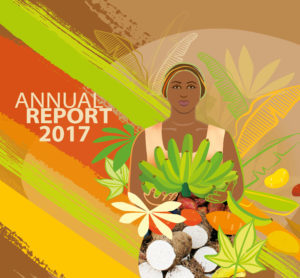DNA fingerprinting has improved the accuracy of adoption studies and revealed that 66% of surveyed cassava farmers in Nigeria are cultivating improved varieties.
Improved cassava varieties can boost yields, helping rural African farm families to become food secure and overcome poverty. A study published in 2017 by the International Institute of Tropical Agriculture (IITA) and partners, with support from RTB, suggests that the adoption of improved cassava varieties is higher than was previously thought. DNA-fingerprinting of cassava leaves revealed that about 66% of surveyed Nigerian cassava growers have adopted improved varieties. Extrapolating these results suggests that around 3.1 million households nation-wide grow the new cassava varieties.
Since the early 1970s, the International Institute of Tropical Agriculture (IITA) has been breeding cassava varieties with resistance to major diseases such as cassava mosaic virus disease (CMD) and cassava bacterial blight (CBB). IITA and partners have developed and released more than 46 high-yielding, disease-resistant cassava varieties, working with the National Root Crop Research Institute of Nigeria (NRCRI), state governments and multiple agencies and projects to promote uptake.
 Continue reading the story in the RTB 2017 Annual Report: From science to scaling.
Continue reading the story in the RTB 2017 Annual Report: From science to scaling.
